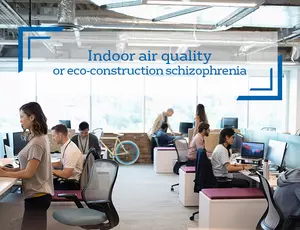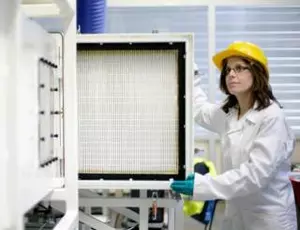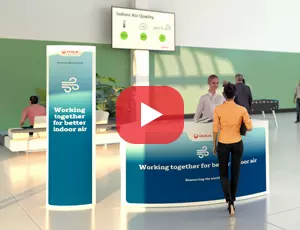Air quality and the impact of atmospheric pollution are a major issue today for public health and quality of life: more than 8 million premature deaths worldwide are reportedly due to air pollution, of which 3.8 million are attributed to indoor air pollution in homes, according to the WHO.
In the same way that Veolia has made access to drinking water a major driver for public health and quality of life, our Group has decided to apply its expertise and solutions to improving the quality of indoor air.

Air-quality: a public health and quality of life issue worldwide
“Invisible” and complex pollution
Air pollution is the contamination of the indoor or outdoor environment by a chemical, physical or biological agent that modifies the natural characteristics of the atmosphere.
Measured by a combination of chemical and electronic methods, air quality is assessed and evaluated using regular monitoring. Increasingly effective sensors and analyzers are connected to a computer system, which records readings at regular intervals. These readings are used to quantify the level of atmospheric pollution in the monitored area.
In France, this monitoring is conducted for outdoor areas by a series of associations (AASQA or approved air quality monitoring associations).
According to ADEME (French Environment and Energy Management Agency), there is no “barrier” between outdoor air quality (OAQ) and indoor air quality (IAQ), as IAQ depends in part on OAQ. While specific measures can and should be introduced to protect and improve indoor air quality, those targeting outdoor air quality automatically have an effect on indoor air quality.
A major public health concern
Air pollution is one of the main environmental risks worldwide. According to the WHO, it was the cause of more than 8 million premature deaths worldwide in 2016. Again, according to the WHO, this would make it the fourth major risk of fatality in the world. Furthermore, the air inside a building is no less polluted than the air outside, even though we spend more than 85% of our time in enclosed spaces.
The results of the 2019 Elabe study for Veolia concerning this issue in France, Belgium and greater Shanghai (China), are significant in this respect: one out of two French, and even more than 60% of Belgians and Shanghai residents are surprised to learn that we are more exposed to pollution in the air inside our homes and the buildings that we frequent than outdoors.
In the same way that Veolia has made access to drinking water a major driver for public health and quality of life, our Group has decided to apply its expertise and solutions to improving the quality of indoor air.
NoUsing our unique expertise to respond to indoor air quality issues
The expertise we have acquired in our water, waste and energy businesses, allows us to respond to air-quality issues, in particular using our expertise in the areas of:
- managing atmospheric emissions from our incineration and hazardous waste technologies
- managing odors emitted by wastewater treatment plants
- auditing and measuring the health quality of water and air flows inside buildings.ts
Additionally, our expertise in managing the energy efficiency of facilities gives us legitimacy in the area of indoor air quality, which is intimately linked to a building’s energy management.
With our experience, we can guarantee our clients quality air at an optimum cost.
Pollution and its consequences in a few figures
Current figures (Source: WHO - 2018)
-
In 2016, 8 million deaths were attributed to air pollution => 4.2 million premature deaths attributed to outdoor air pollution and 3.8 million premature deaths attributed to indoor pollution in homes.
-
In 2016, 91% of the world’s population lived in places where the WHO air quality guidelines were exceeded.
-
In 2015, the health cost of air pollution was estimated to be $21 billion and air pollution was reported to account for 1.2 billion days loss of productivity (Source: The economic consequences of outdoor air pollution, OECD, September 2016).
2060 forecast:
-
Up to 9 million premature deaths per year (Source: IHME: Institute for Health Metrics and Evaluation
-
Air pollution could cost up to 1% of global GDP in 2060 (the impact on labor productivity, health costs and agricultural crop yields would lead to a gradual increase in global economic costs of up to 1% of global GDP) (Source: OECD)
-
Each year, the expected health costs would be $176 billion and the impact on productivity has been assessed at 3.7 billion days lost (Source: The economic consequences of outdoor air pollution, OECD, September 2016).
A lead contractor and integrator guaranteeing exemplary air quality
Veolia’s purpose is to contribute to human progress by adopting a concerted approach to the UN’s Sustainable Development Goals. It must therefore take into account all types of pollution including those that are not yet well known or managed by the general public.
With its expertise in energy services, Veolia already helps its clients reduce their ecological footprint (energy efficiency, effective management of facilities, etc.).
Veolia offers its clients an air quality guarantee, which others do not yet offer.
The Group acts as a lead contractor and integrator for all the components needed to guarantee its clients – public or private building managers – exemplary air quality for the health of their occupants or users, and to comply with energy efficiency and asset improvement issues. Veolia covers the entire IAQ value chain: audit and diagnosis to define the situation, manage facilities with continuous monitoring, supply and install appropriate systems to treat air or remove pollution, and to involve occupants in improving a building’s air quality.
Specific products and solutions
Veolia: has for many years been developing indoor air quality solutions:
- Audits, diagnostics and recommendations including the audit of air treatment facilities
- Rollout and management of action plans including equipment improvement programs
- Crisis management systems
- Reporting.
Today, Veolia provides its clients with a new offer to improve their indoor air quality.
This offer includes three different service modules: AIR Control, AIR Performance and AIR Human.
They have been developed for each type of client (offices, schools, medical centers, shopping malls, hotels, etc.), in order to factor in their various needs and specific expectations.
Three service modules to adapt to various needs.
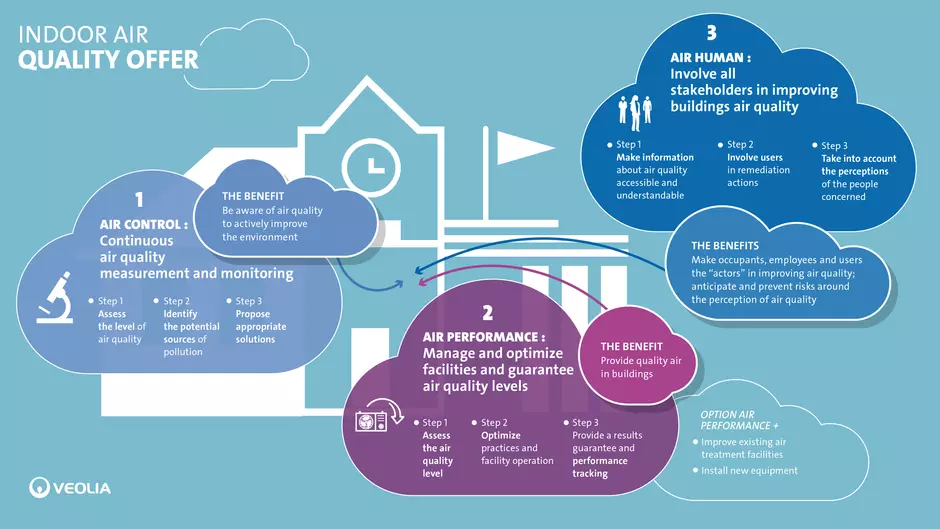
1. AIR Control: Continuous air quality measurement and monitoring
The benefit => Be aware of air quality to actively improve the environment.
Step 1: Assess the level of air quality
Technical and health audit
Analyze the pollutants, odors and allergens
Install a continuous monitoring network
Potential pollution models and maps
Provide an air quality tracking dashboard
Step 2: Identify the potential sources of pollution
Process analyses and technical facility emission audits
Specific sampling at emission points
Diagnosis of the sources of pollution and their relative contribution
Step 3: Propose appropriate solutions
Advice of an expert to recommend improvements
Assistance in the event of a crisis or abnormal increase in pollution concentrations.
Veolia’s expertise => 100 years of experience with sampling strategies and optimizing environmental monitoring tools; a selection of sensors approved by the best measurement laboratories (3 sensors approved in 2018 by AIRLAB, 2018 micro-sensor challenge); results checked by our air quality experts.

2. AIR Performance: Manage and optimize facilities and guarantee air quality levels
The benefit => Provide quality air in buildings
Step 1: Assess the air quality level
Diagnose existing facilities and sources of pollution
Install a network of communicating sensors
Interpret the results and propose an action plan
Step 2: Optimize practices and facility operation
Implement best practices in processes
Servicing and maintenance of air quality facilities
Adjustment of treatment systems
Step 3: Provide a results’ guarantee and performance tracking
Specific air quality dashboard
Set monitoring thresholds to reflect needs
Summary reports of results and warnings
Recommended actions in the event of established thresholds being exceeded.
Option: AIR Performance +
Improve existing air treatment facilities
Install new equipment
Veolia’s expertise => Proven expertise in operating facilities requiring air treatment (more than 42,000 facilities operated); Smart performance management centers: 23 Hubgrade platforms worldwide.

3. 3. AIR Human: Involve all stakeholders in improving air quality
The benefits => Make occupants, employees and users the “actors” in improving air quality; anticipate and prevent risks around the perception of air quality.
Step 1: Make information about air quality accessible and understandable
Specific Web app
Air quality training modules tailored to the specific concerns
Step 2: Involve users in remediation actions
Interactive discussion interface for the stakeholders (report impressions, opinion surveys, etc.)
Creation of Air challenges (Air Day, etc.)
Step 3: Take into account the perceptions of the people concerned
Report tracking and dashboard
Objectivate discomfort
Take perceptions into account in the remediation solutions
Track the “well-being” indicator compared against air quality
Participative workshops about behavior and best practices impacting on air quality
Veolia’s expertise => Constant commitment to involving all stakeholders (Commitment No. 4 of the CSR approach); diverse feedback from a worldwide group; efficient digital tools to communicate with the stakeholders; and social and societal scientific expertise in the area of air quality.

Veolia mobilized alongside the UN
The Group is urging all its employees worldwide to take part in the Air quality challenge organized with the support of UN Environment and the Veolia Foundation. All employees are encouraged to go to work using an eco-responsible form of transportation: walking, bike, scooter or mass transit. A tree will be planted for each of these green trips.
The Veolia Foundation will also be supporting the “It’s Our Air” educational kit produced by UN Environment for junior and senior high school teachers to raise teaching staff and students’ awareness of the fact that air quality is the greatest risk in terms of environmental health.
This kit will be available in French, English and Chinese and will be distributed soon by UN Environment and UNESCO through their partner school network.
They chose our solutions
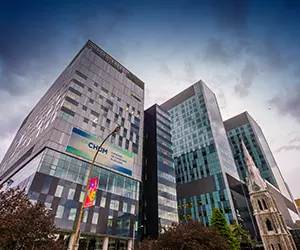
Achievement
Hospital air quality. A priority for CHUM Hospital
CHUM (Montréal University Hospital) in Canada was created in 1996 following the merger of three hospitals: Hôtel Dieu, Hôpital Notre-Dame and Hôpital Saint-Luc. It opened its doors in 2017. A true technical feat, this ultramodern, 772-room hospital, expects the best possible for the health and safety of its patients. Veolia was selected under a 34-year broad scope energy performance PPP contract. On site, Veolia manages and maximizes the operation of more than 320,000 pieces of mechanical equipment. In addition to safety and energy efficiency issues, Veolia is responsible for the quality of the indoor air, which must be irreproachable. The company has 60 employees working full-time at the hospital.
►Watch the video of Julien Beaunoyer, Health & Safety Engineer for Veolia at the Montréal University Hospital
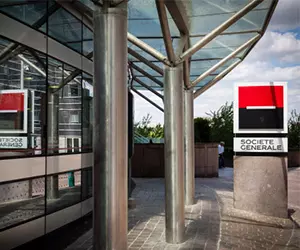
Achievement
The best standards for Société Générale
Société Générale contracted Veolia to carry out an indoor air quality study at its historic headquarters and Parisians branches (30 sites), with a view to guaranteeing the safety and comfort of the buildings’ users and reporting on the condition of all the air handling units (AHUs). Veolia conducted audits of the ventilation systems and undertook a campaign of physical, microbial and chemical measurements. Thanks to the action plan implemented, Société Générale has been able to comply with the best air quality standards and provide its customers and employees with optimum thermal comfort. In addition, these improvements have increased transparency and traceability of energy systems within the banking group.

Achievement
Improved comfort for the new Gaumont movie theaters
Ensuring the wellbeing of its more than 80,000 moviegoers a year and guaranteeing them a high quality of health and safety standards were priorities for Gaumont in its new movie theaters in Lyon and Caen (France). The group contracted Veolia for this assignment. By optimizing HVAC (heating, ventilation and air-conditioning) settings and continuously controlling temperature, humidity, CO2 and particulate levels, Veolia was able to guarantee Gaumont a reliable indoor air quality and ensure the satisfaction of moviegoers with regard to the quality of the air they breathe and their thermal comfort.
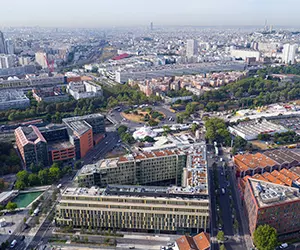
Achievement
Optimize equipment and put users in charge of their quality
Veolia is one of the founding members of the AIRLAB initiative launched by Airparif in 2017. Its aim is to speed up pollution reduction in Paris and its metropolitan region, whatever the source. AIRLAB aims to encourage and coordinate innovation in the field of air quality by identifying and stimulating new drivers, whether they are technical, social or behavioral. This initiative brings together several economic and research stakeholders, together with start-ups and SMEs.
The projects headed by AIRLAB and Veolia include: 2018 Microsensor Challenge, 2019 Microsensor Challenge, and the Air4kids project.
The latest addition to this panel is “Un souffle nouveau dans les bâtiments” (A breath of fresh air in buildings). Convinced that users are first in line where IAQ is concerned and that they must be included in IAQ improvement action plans, Veolia has called on start-ups having designed innovative solutions for indoor air quality to test and validate in Icade’s offices a new generation of sensors able to act continuously on air-quality in office buildings. The aim is also to factor in employees’ perceptions (AIR Control and AIR Human). The entire system has been in place since the end of April and the coming months will provide an opportunity to compare the monitoring results against feedback from the offices’ occupants.





